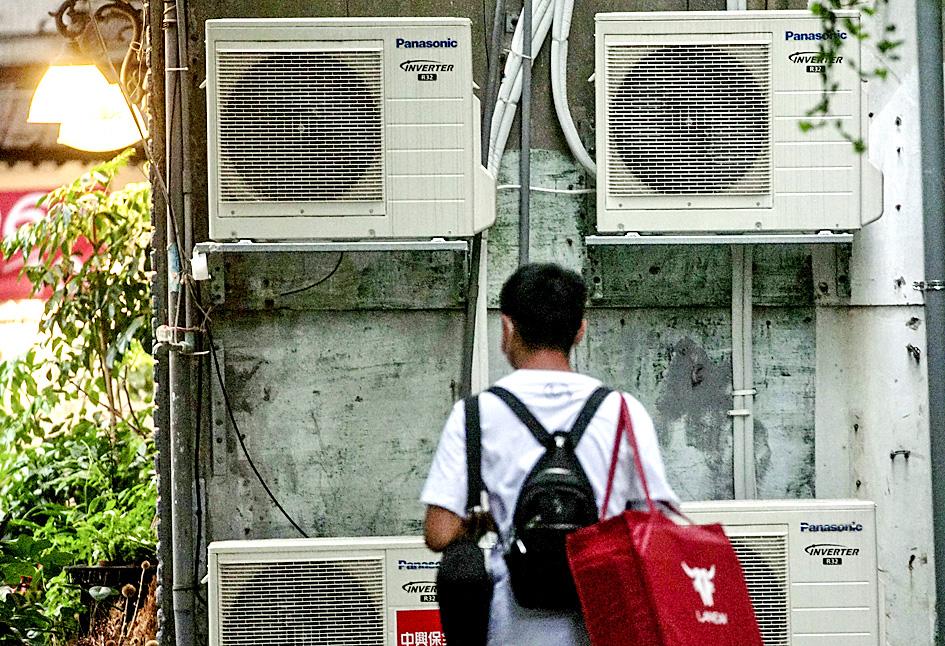An increase in electricity rates, which is imposed annually in the summer to discourage high consumption, takes effect today, with a potential maximum increase of 27 percent, state-run Taiwan Power Co (Taipower, 台電) said yesterday.
However, electricity prices would stay flat at NT$0.63 per kilowatt-hours (kWh) for about 3.72 million households that consume 120kWh or less a month, Taipower said.
Under the summer rate scheme, electricity rates would increase to NT$2.38 per kWh, from NT$2.10, for 5 million households that consume from 121kWh to 330kWh, and for households that consume 501KWh to 700kWh per month, their electricity bills would increase to NT$4.8 per kWh from NT$3.94, while electricity rates for households that consume 1,000kWh or more a month would see rates rise to NT$6.41 per kWh from NT$5.03, the company said.

Photo: CNA
The higher summer rates, introduced in 1989, would be in effect until Sept. 30, and would be calculated for each household or company based on their consumption, Taipower said.
This year, summer rates could increase up to 27 percent compared with standard rates in the October-to-May period, the company said.
Under the summer rate system, the average household is expected to pay NT$506 more per month for electricity this year, Taipower said.
The average household consumption in Taiwan in summer last year was 434kWh per month, compared with 291kWh per month for the rest of the year, it said. Overall, the average household consumption was 339kWh per month for the whole of last year, it added.
Power usage is likely to increase this summer amid the COVID-19 outbreak, which has resulted in more people staying at home to avoid risk of infection, Taipower spokesperson Chang Ting-shu (張廷抒) said.
Taiwan experienced two rounds of rolling blackouts last month due to human error and a supply shortfall respectively, prompting concerns about a stable energy supply in summer.

To many, Tatu City on the outskirts of Nairobi looks like a success. The first city entirely built by a private company to be operational in east Africa, with about 25,000 people living and working there, it accounts for about two-thirds of all foreign investment in Kenya. Its low-tax status has attracted more than 100 businesses including Heineken, coffee brand Dormans, and the biggest call-center and cold-chain transport firms in the region. However, to some local politicians, Tatu City has looked more like a target for extortion. A parade of governors have demanded land worth millions of dollars in exchange

An Indonesian animated movie is smashing regional box office records and could be set for wider success as it prepares to open beyond the Southeast Asian archipelago’s silver screens. Jumbo — a film based on the adventures of main character, Don, a large orphaned Indonesian boy facing bullying at school — last month became the highest-grossing Southeast Asian animated film, raking in more than US$8 million. Released at the end of March to coincide with the Eid holidays after the Islamic fasting month of Ramadan, the movie has hit 8 million ticket sales, the third-highest in Indonesian cinema history, Film

Taiwan Semiconductor Manufacturing Co’s (TSMC, 台積電) revenue jumped 48 percent last month, underscoring how electronics firms scrambled to acquire essential components before global tariffs took effect. The main chipmaker for Apple Inc and Nvidia Corp reported monthly sales of NT$349.6 billion (US$11.6 billion). That compares with the average analysts’ estimate for a 38 percent rise in second-quarter revenue. US President Donald Trump’s trade war is prompting economists to retool GDP forecasts worldwide, casting doubt over the outlook for everything from iPhone demand to computing and datacenter construction. However, TSMC — a barometer for global tech spending given its central role in the

Alchip Technologies Ltd (世芯), an application-specific integrated circuit (ASIC) designer specializing in server chips, expects revenue to decline this year due to sagging demand for 5-nanometer artificial intelligence (AI) chips from a North America-based major customer, a company executive said yesterday. That would be the first contraction in revenue for Alchip as it has been enjoying strong revenue growth over the past few years, benefiting from cloud-service providers’ moves to reduce dependence on Nvidia Corp’s expensive AI chips by building their own AI accelerator by outsourcing chip design. The 5-nanometer chip was supposed to be a new growth engine as the lifecycle